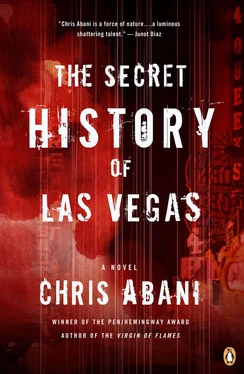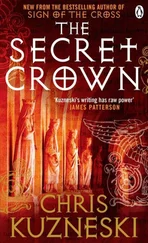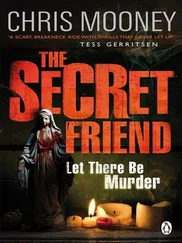It’s not like we are terrorists, Doc. That’s apartheid, Fire said.
You never answered the question. Where can I find Fred.
Does it matter? Like Water said, Fred will come for us.
But what if I wanted to see your circus act, Sunil said. Where would I go?
Sideshow, Fire said.
I’m sorry, I don’t understand, Sunil said. What’s the difference?
Circuses are about entertainment and juggling and animals and all that shit. Sideshows are about freaks, about people and the limits of acceptability. We push those limits. If a circus is an escape, Fire said, a sideshow is a confrontation.
I see, Sunil said, writing. And you feel empowered by this difference?
Damn fucking right we do, Fire said.
“Circus” comes from the Latin for “ring” or “circle,” Water said.
What does a fire wizard do, exactly, Sunil asked.
I can show you, Fire said.
You’re not going to burn the building down, are you, Sunil asked.
Fire just glared at him. Watch, he said.
But it was Water who moved, not him, reaching for a piece of paper. With quick but graceful movements, he shaped it into a white origami moth with an eight-inch wingspan. Water held it up to Sunil and cupped his hand around the paper moth.
Fire began a mesmerizing incantation, and as Sunil watched, Water opened his hands and the paper moth fluttered into flight for thirty seconds. It hovered over his palms for another ten seconds and then burst into flames, the ash falling into Water’s cupped palms. He rubbed them together and once again held up the white origami moth.
Smiling, he passed the paper moth to Sunil.
How did you do that, Sunil asked, turning the fragile paper moth gingerly over in his hands.
We are the witchdoctor, Fire said.
Impressive, Sunil said.
Water got up and walked toward the wall of photos. What are these, he asked.
They are photos of cows, Sunil said.
A cow stands up and sits down fourteen times a day, Water said.
I would like to meet Fred, Sunil said.
Well, we all like what we like, Fire said. Did you take these photos?
Yes, a very long time ago, with a dinky old Kodak camera. I was seven or eight. They are Nguni cows. They remind me of home.
Ah, home. More nostalgia than memory, Fire said.
The Nguni name all their cattle, you know? This one here, Sunil said, pointing to one of the cows, is called Inhlakuva, sugar bean, because its markings resemble a sugar bean; and this one is Imfezi, the spitting cobra; and this creamy speckled one is called Amaqandakacilo, egg of the lark, Sunil said.
For real, Doc, Fire asked.
Sunil explained that each beast in a Nguni herd was an individual that carried its uniqueness in its color patterns, horn shapes, and gender, which bestowed on it a status and even a history. With the respect accorded to family, the cows were classified according to what symbols or landscapes the color patterns of their hides resembled. And while the monikers were used primarily for identification, this system of naming was part of a highly sophisticated philosophical worldview.
This one, Sunil continued, is Insingizisuka, the ground hornbill takes to flight. These ones here probably have a compound name, Sunil added, pointing to a group of cows under a thornbush tree. Izinkonwazi Ezikhula Zemithi, I would guess. It means the cows which are the gaps between the branches of the trees silhouetted against the sky. And this one is Inkomo Ebafazibewela Umfula, the women crossing the river.
You’re making that last one up, Fire said, laughing.
No, I’m not. See here? It’s because the cow has white legs and belly and a colored body with this wavy line here separating them. The wavy line looks like water lapping the legs, see?
And all the cows are named, Fire asked. Strange, don’t you think, that the Zulus were so good at classification, and then the Boers came along and used it against them.
Sunil shook his head. It was too much to consider. All empire is about classification, he said. For the Zulu it was cattle, for the Boers, it was blacks. The Boers perverted everything.
They had help, Fire said.
Sunil turned his attention back to the photographs. With his index finger he traced the horns of one of the cattle.
There is a whole other nomenclature associated with horn shapes, he said.
Yeah, Fire asked.
There is a beautiful saying that refers to the first light of dawn that makes me think about cattle horns silhouetted against the byre sky. Kusempondozankomo, I think it is, which means the time of the horns of the cattle, Sunil said.
What’s that one called, Fire asked.
That one is called Umndlovu, the elephant, because its horns are curved down straight like the trunk of an elephant. I can’t really release you if I don’t think there is someone who I trust to vouch for you. I need you to tell me how to find Fred.
You’re not going to release us anyway, Doc, Fire said. Why would you when you can keep us here and study us? Now, tell me more about the cows.
I think that’s enough for now, he said.
Are we ever going to get that phone call, Fire asked.
I’ll call a nurse and I will come by later this evening to check on you.
Salazar pulled across the wood, the sharp wood plane shaving a slight curl that fluttered to the ground. He ran his finger over the grain and, satisfied, put the wood plane down. Light balsa wood showed through, contrasted by the walnut stain around it. Salazar had been building boats for almost twenty years, and this one, a replica of a seventeenth-century Spanish war galleon, for about two years.
He’d built them since his first kill on the job: Jim, a junkie kid.
Jim had been something of an institution in the Fremont section of town, and cops were always called out to handle him. He was basically harmless, Sergeant Vines, Salazar’s partner and ten-year veteran of the force, always told him. But then they’d been called out because Jim was wielding a knife and threatening a homeless woman.
Following procedure, Salazar trained his gun on the kid, while Vines, a Vietnam vet who loved to chew on cheroots and was plainspoken, tried to talk Jim down.
Now, son, put down the knife.
Stay back! Jim shouted. I’m warning you.
What’s happening, son? You know you don’t want to hurt anyone, Vines said.
Stay back!
See that man over there with a gun, Vines said. That’s my partner, fresh out of the academy. I don’t want him to shoot you, but right now he’s more scared than you are.
Jim lowered the weapon, then suddenly lurched forward. It was unclear if he meant to lunge or if he had merely felt his legs giving way, but Salazar panicked and squeezed off a shot. The 9mm slug slammed Jim against the wall behind him before he dropped. People seldom die in real life the way they do on TV, and Salazar watched Jim writhe for a long time, bleeding out. When the paramedics arrived, it was too late.
Hell of a fighter, Vines said. As messed up as he was you’d think he would’ve died sooner.
Yeah, Salazar mumbled.
Sorry, rookie, hell of a first week. Listen, there’ll be a board of inquiry to determine if it was a good shooting. Don’t worry, you’ll be fine, just don’t say anything without a union rep present.
Okay.
Good. They’ll also want you to see the department shrink, who’ll try and get you to talk about your feelings.
A shrink?
Don’t worry. It’s procedure. Just do it.
Okay.
That won’t help you much, you know?
How do you know?
Stop asking questions, rookie, and listen.
Sure, yeah.
More than likely, you’ll start drinking a lot to calm yourself, and then you’ll get the shakes every time you draw your weapon, so you’ll drink some more to control those shakes, and then your hands will shake some more and you’ll either kill someone else or you’ll get killed. Either way, it’s no good.
Читать дальше












